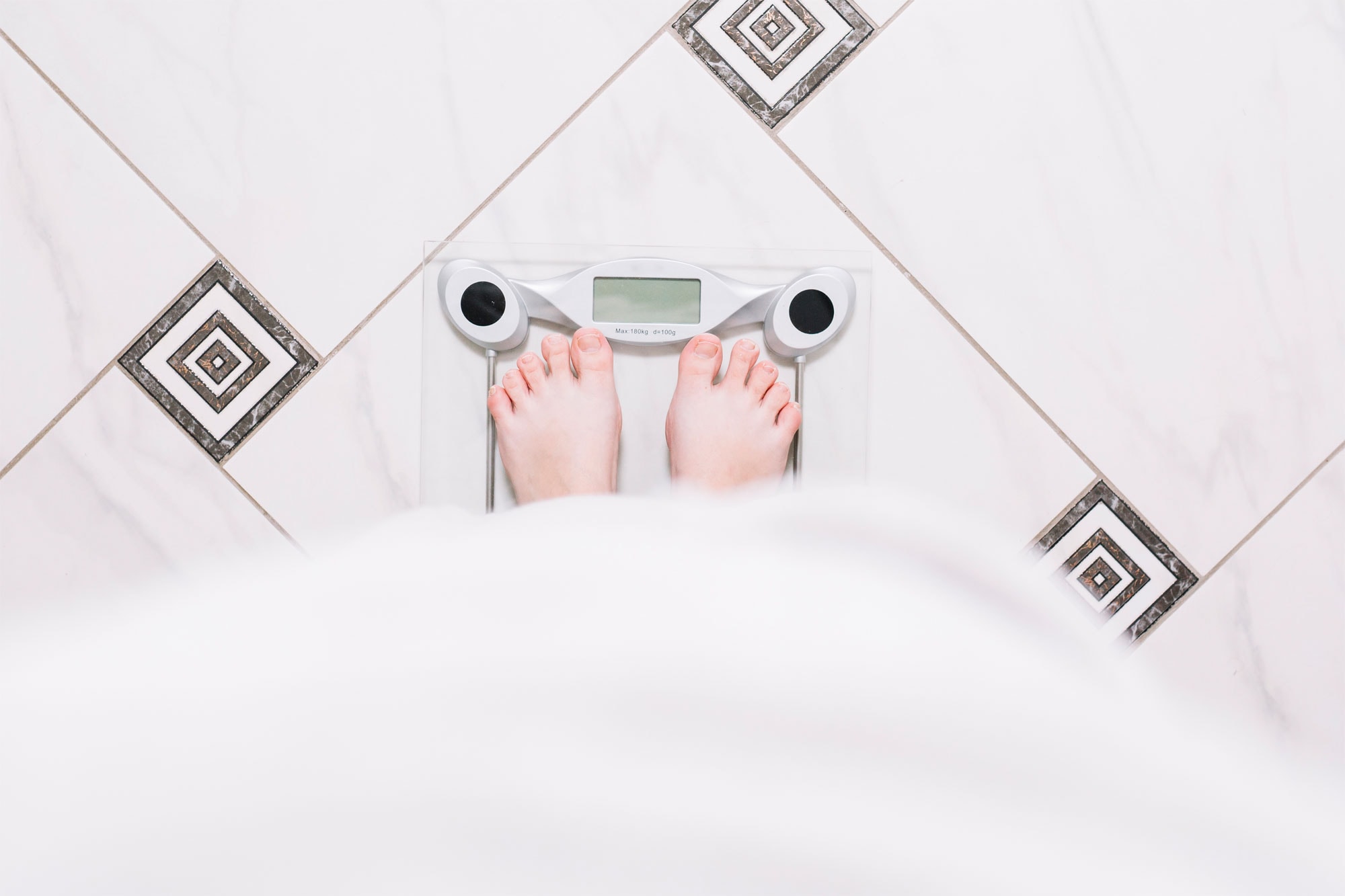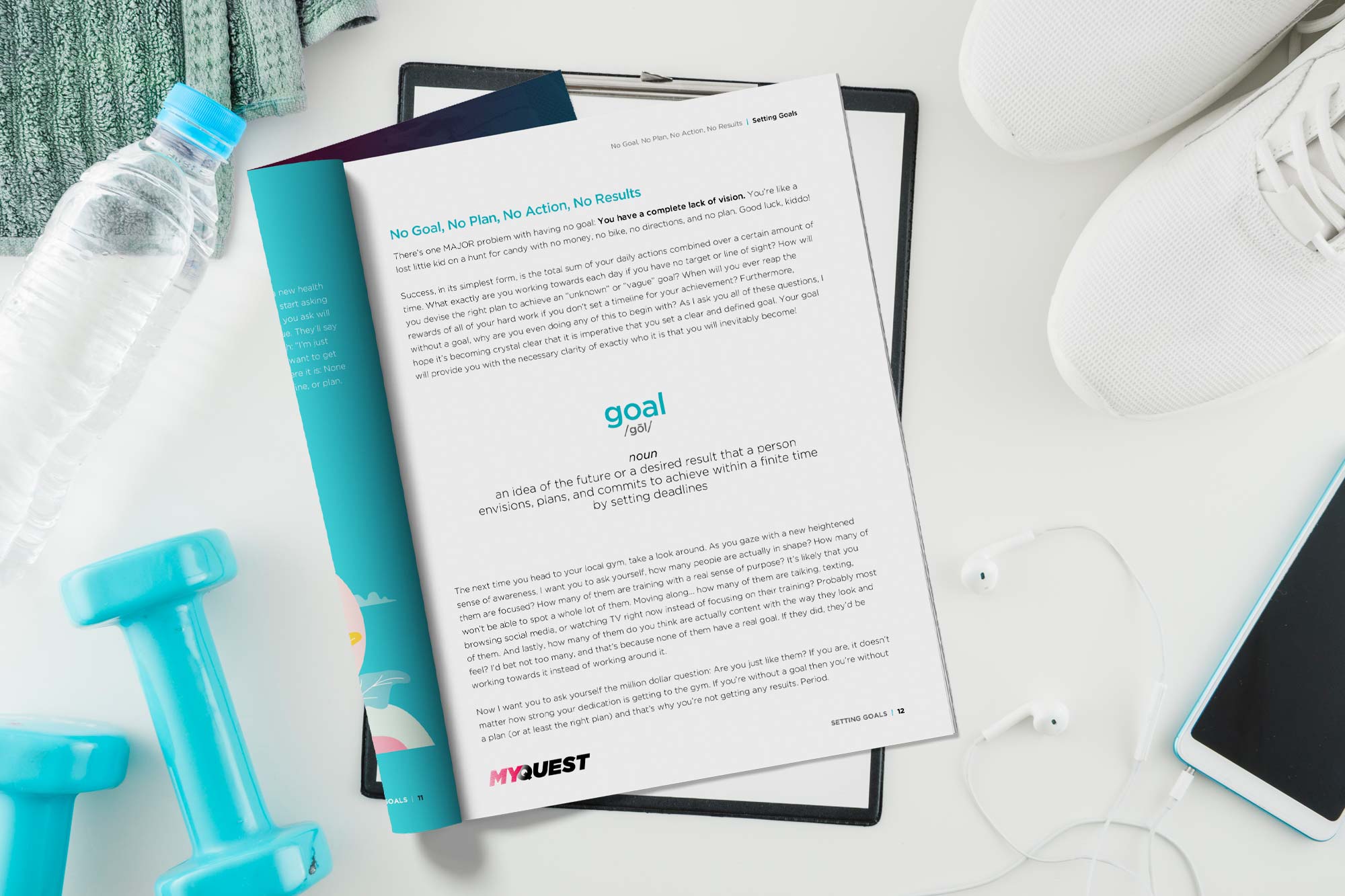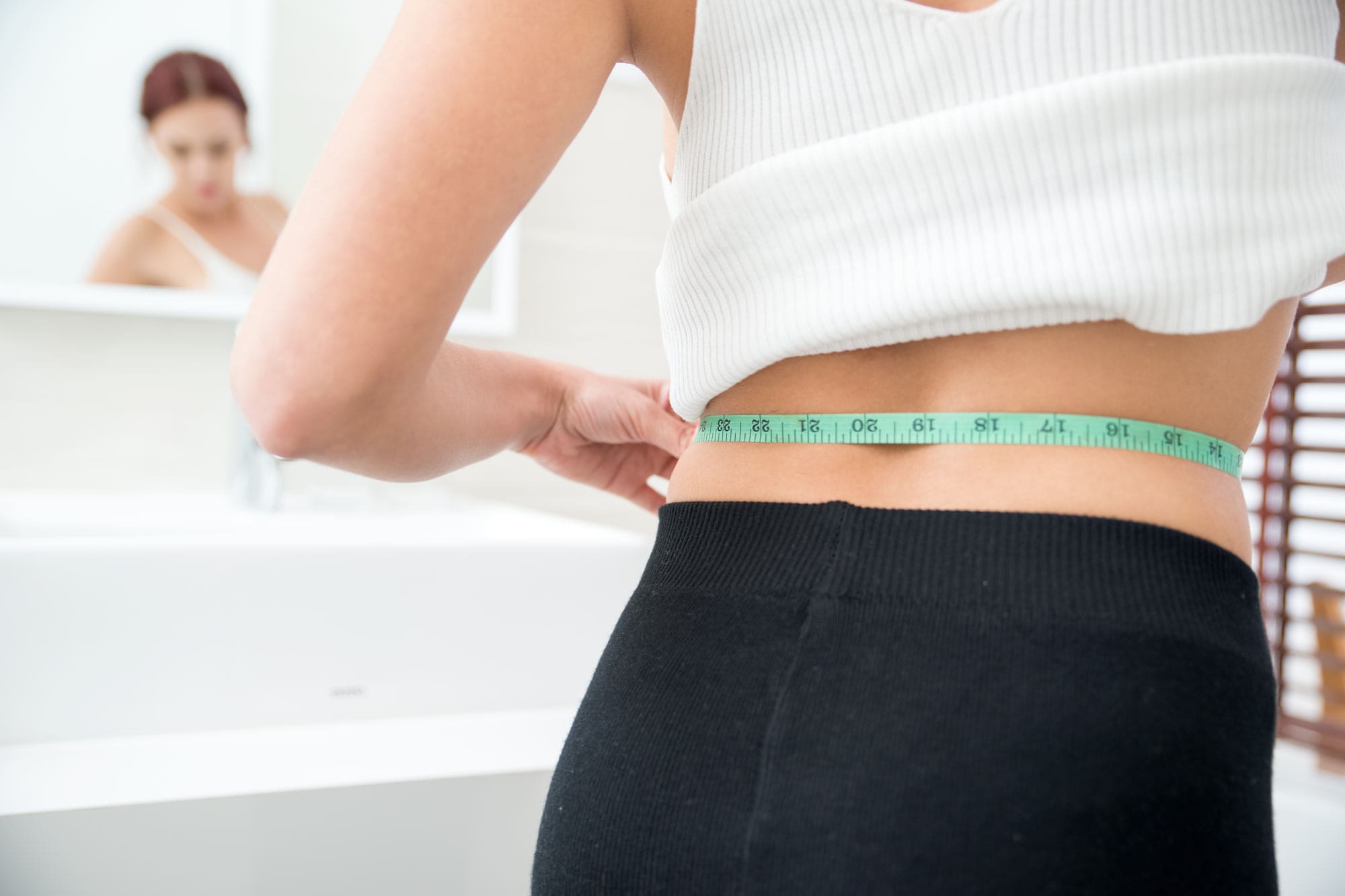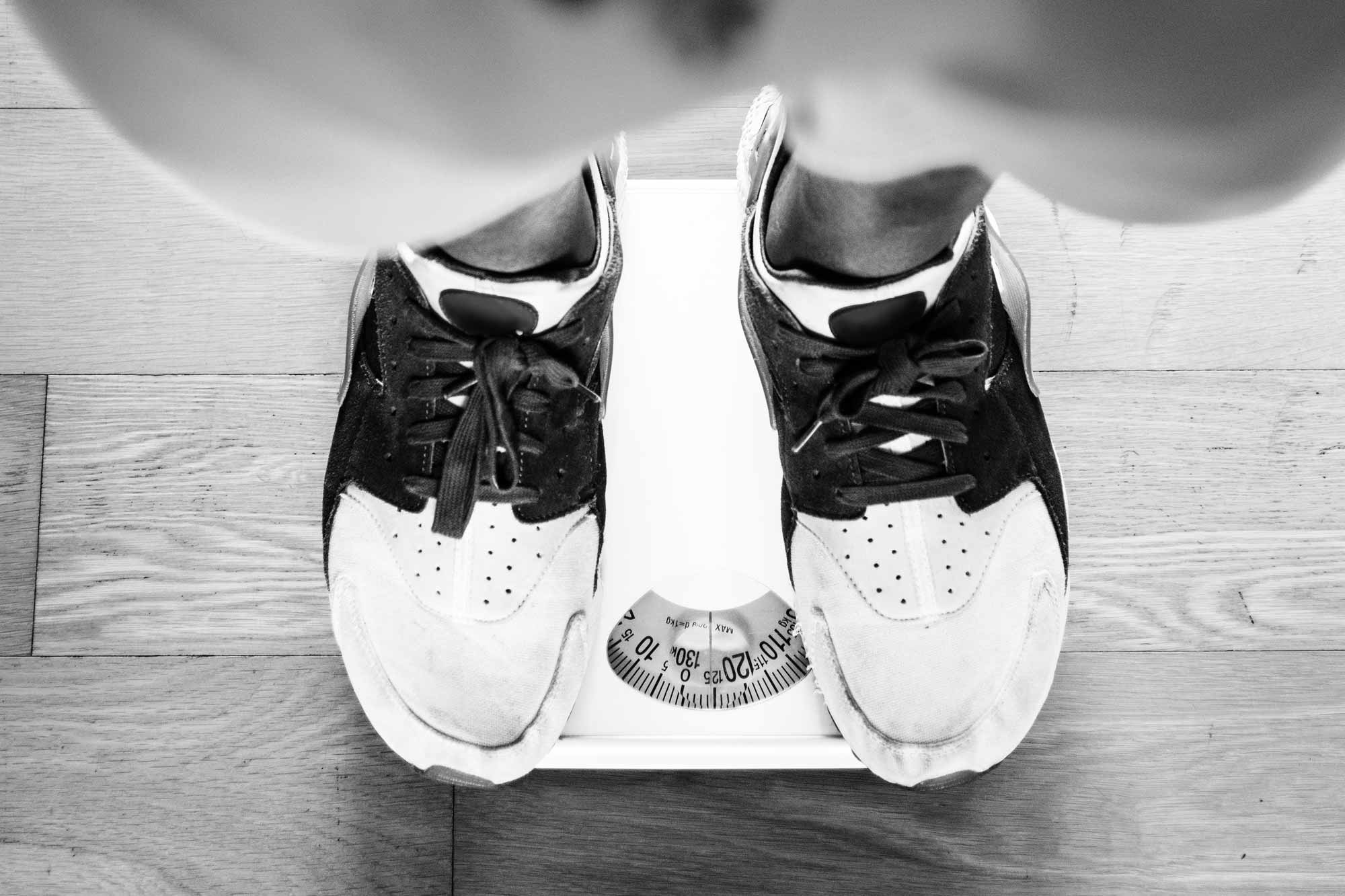
Trying to figure out how often to weigh yourself, or even exactly how to do it right, can prove to be a difficult task. No one ever really teaches us when or how often to weigh ourselves, how exactly to weigh ourselves, or even the reasons why we should do it. But there are definitely best practices.
The Short Answer:
The most effective and most logical way to track your weight is in weekly intervals, as it gives you a more accurate update on your progress over an extended period of time. However, depending on who you ask, the most common four answers you will receive are:
- every day
- weekly
- monthly
- never
Tracking Your Weight Is Important
Though opinions differ greatly on this topic, I think that monitoring your weight weekly is an important part of reaching your fitness goals for one main reason: to track your progress. I mean… how else will you know if your plan is actually working?
On the flip side, there will be times during your fitness journey that the number on the scale can start to become deceiving and — its true value — muddled. And this is where the argument is usually made that the scale is not a very good indicator of your progress.
With that being said, rather than have you ignore the scale altogether, my aim is to give you more clarity on the entire situation.
By the end of this article, my hope is that you’ll have more clarity on the importance of weighing in, how to weigh-in correctly, why the number on the scale can vary so greatly, which weigh-in interval is most suitable for you, and what the number on the scale should mean to you overall.
When you’re done reading, leave a comment down below to let me know if I succeeded with that. And if I didn’t, let me know that too. I’m always trying to make these articles better so they can help more people. 😃
Here’s exactly what we’ll cover in this article:
Feel free to use the navigation box above to skip ahead at your leisure. However, if you want to gain more perspective on the logic behind each one, I highly suggest that you continue reading along.
What’s the Purpose of Weighing Yourself
Definitely NOT to judge yourself! Instead, you do it for the exact same reason people take body measurements and do body fat analysis — simply to track your progress.
I think it’s safe to presume that if you’re toying with the idea of weighing yourself regularly, then you’re more than likely starting some sort of fitness journey with the primary goal of either losing weight or gaining weight.
And when you set a new fitness goal, you should first have a general idea of where you’re starting from and an extremely clear and decisive vision of where it is you’re going.

Need help finding clarity on your goals?
Download our free Mindset Guide! You’ll learn: How to set meaningful goals and how to increase your chances of success.
We 100% respect your privacy and will never, EVER, share your personal information or spam you — no B.S.
If we think of this in terms of traveling to a destination, the scale is simply a tool — your GPS system, if you will — to help make you aware of how far you’ve gone and how much distance there is left to travel.
This can help you in two ways:
- If and when you make modifications to your diet or training program, the scale will help you confirm whether or not those changes are pushing you in the right direction.
- If you begin slacking off — knowingly or unknowingly — with your exercise or nutrition, the scale can usually be a clear indicator of this.
Any other reason for weighing yourself would be purely for entertainment sake.
The Bottom Line:
If you’re not weighing in to establish an initial marker or to track your progress for a specific goal, then you’re doing yourself a HUGE injustice.
Tracking Your Weight Accurately and Effectively
To understand how to track your weight correctly, you must first understand two important concepts:
- There are many variables that affect your total body weight
- The process of weight-loss and weight-gain is not linear
There Are Many Variables That Affect Your Weight
There are a number of factors that combine to produce your total weight on any given day, including but not limited to: your skeleton, organs, fat, muscle, water weight, food weight, etc.
Out of these, the factors that vary the most throughout the day are your water weight (the amount of water that you just drank or that your body is retaining) and food weight (the things that you just ate or that have already been digested and haven’t been pooped out yet).
To give you some perspective on this, 1 L of water weighs exactly 2.2 pounds. Every single morning, right after I wake up, one of the first things I do is drink 1 L of water. Which means within 15 seconds (literally), my body weight goes up by 2.2 pounds — instantly. Don’t believe me? Try it out yourself and leave a comment with your findings.

The point I’m trying to make here is that if I weighed myself right after drinking that liter of water, I would have a completely false figure of my true body weight. If I was a beginner in the fitness game, I may even think that I put on 2.2 lb of fat since last night. Obviously — but maybe not so obviously to some — this would be entirely false.
Under completely normal circumstances, the majority of that newly consumed water would be released from my body via urine — and sweat if I worked out immediately after — quite quickly, and my body weight would return to normal. However, there are a number of factors that could cause my body to retain some of that water instead.
Water Retention 101
There are three main contributing factors that greatly affect the amount of water your body will retain, and therefore how much your weight may vary from day to day:
- carbohydrate consumption
- sodium consumption
- total water consumption
Carbohydrate Intake
For each gram of carbohydrate that you consume, your body stores about 4–5x that weight in water. So if you’re on a high-carb diet, you will retain a lot more water. And if you’re on a low-carb diet, you will naturally retain less water.
This is why people who switch to a ketogenic diet, where they’re consuming 50 g of carbs or less per day, experience such amazing “weight-loss” results within their first week. The truth is that the majority of the weight that they’ve lost during that first week is simply the result of a significant decrease in water weight and NOT a major loss in fat at all.
Sodium Intake
Consuming lots of sodium (salt) causes immediate water retention. The majority of sodium you consume ends up in your blood. Your body needs to make sure to balance the water-sodium ratio in your blood to function optimally — this is why a chronically high-sodium diet causes high blood pressure issues.
Naturally, if you consume too much salt, and especially aren’t drinking enough water, your body’s immediate defense mechanism is to hold on to additional water to in an attempt to restore the delicate balance of your blood.
Water Intake
When you drink lots of water on a regular basis, your body identifies the fact that you have an abundance of water available to you; therefore, it has no reason to hold on to it — since it knows it will be be supplied with more water shortly — and flushes it out of your system very quickly.
On the other hand, when you’re under-hydrated, your body views this as you having LIMITED access to water. In an effort to increase your survival time, it holds on to additional water — as an emergency backup supply — that it can use for later in the event that you have no drinking water available to you.
It’s Worth Mentioning:
The effects that water can have on overall weight are even more pronounced in women, since their menstrual cycles can cause major fluctuations in water weight.
The Process of Weight-Loss and Weight-Gain Is Not Linear
If you’ve ever dieted to lose weight in the past, then you would have surely experienced something similar to the following:
You start your new diet and exercise program and you’re doing great; you lose 10 pounds over the course of four weeks.
You continue dieting and training and all of a sudden you weigh in on week 5 and the scale hasn’t moved — or worse yet, you’ve gained a pound! Uh oh! Sound the alarm! 😲
Not so fast… 🛑✋

There will be many times where the scale may not budge — for weeks at a time even — yet you’re still making significant progress in the way of overall body composition.
And if you were tracking your body measurements (which is highly recommended) in addition to tracking your body weight, you’d see right through this.
In addition, you may also be making HUGE strides in other areas that are intangible, such as enhancing your mindset, removing mental blocks, or building new habits and routines.
To give you a better understanding of this, take a look at this time-lapse graph of a real client that I worked with in our online fitness coaching program from May 2020 through to March 2021.

This client lost almost 30 pounds over the course of 10 months (and has since kept it off), but she was in panic mode almost every single week of the journey. 😅
If I wasn’t there to hold her hand the entire way, she likely would have quit her fat-loss journey 2 or 3 months in, never to reach her end goal!
This will be the exact same scenario for most beginners. Why? Simply because they don’t understand what’s happening week-to-week.
And when we don’t know what’s going on, more often than not, we assume the worst. In reality, there are really only a few things that actually can be happening here:
- You’re carrying some extra water or food weight (as explained above)
- You’ve put on more muscle this week than you lost fat
- You’ve gained weight because you actually didn’t stick to your diet
For the client above, it was a combination of all three across her entire 10-month journey.
Here’s the thing: It’s entirely normal for your body weight to fluctuate up and down by several pounds per day.
In fact, I’ve witnessed my own body weight fluctuate by as much as 10 pounds in a single day (due to food weight, carb loading, and excessive water retention).
Given my level of understanding on this topic, this did not pose a single cause for concern for me. However, since this is so difficult for most beginners to grasp and it can become extremely discouraging throughout their quests, I think it bears repeating:
Understand that there will be times along your weight-loss or weight-gain journey that the scale might not budge at all, even though you are making HUGE strides in regards to your overall body composition and physical performance.
If you know, with absolute certainty, that you’re following your training and nutrition program to the letter, then just keep going! As you become more experienced and knowledgeable, you will take these moments for what they are — bumps in the road.
How to Weigh Yourself Correctly
Now that we understand these two important concepts, we should easily understand the following: The most accurate and effective way of tracking your weight is by performing your weigh-ins in a consistent fashion.
There are three simple rules that you can follow to accomplish this. Always weigh yourself:
- at the same time of day at each weigh-in
- under the same exact circumstances at each weigh-in
- naked; or in your undergarments
What does this mean exactly? Well, if I were to weigh myself weekly, for example, I would weigh myself each and every Monday at 4:30 a.m. as soon as I get up — that solves rule #1. To take it a step further, I would make sure that I never eat or drink anything before weighing myself — that solves rule #2.
Get Even More Accurate
If I wanted to take this even a step further, which I personally do, I would make sure that I only weigh myself after I’ve sat on the toilet and completed my #1 and #2 for the morning. For me, my body functions like clockwork, so my #2 comes right on schedule every morning without fail. TMI?
P.S. You could just as easily avoid this step if it feels like overkill. 😄
Lastly, don’t weigh yourself with clothes or shoes on. This should be obvious, but clothes are heavy and every outfit you wear weighs an entirely different amount.

Remember: We’re trying to keep things as consistent as possible to give ourselves accurate readings each weigh-in.
If you’re weighing yourself naked first thing Monday morning at 8 a.m. and then Thursday evening at 7 p.m. at the gym fully clothed in sneakers and then Sunday afternoon right after you ate a huge brunch, you’ll get three completely different numbers each time you step on the scale.
This, of course, is a complete waste of time and effort, since the only reason you’re weighing yourself to begin with is to accurately track your progress.
Which Weigh-In Frequency Is Right for You?
At this point, I think we can agree on the following two things:
- Weighing yourself is important to track your progress
- Weighing yourself in a consistent manner provides the most accurate data
Next, we will discuss the final major point: How frequently should you weigh yourself?
As promised in the beginning of this article, I’m going to break down the pros and cons for all four options and then you can decide which is the best option for yourself. Let’s start with the most frequent method — daily.
1. Daily
We now know that the main reason for weighing ourselves is to track our progress. And herein lies my biggest issue with weighing yourself daily: It’s much too frequent of an interval to provide you with any useful information!
In addition, now that you know how greatly your weight can fluctuate from day-to-day, why would you even want to use this method to begin with?
We’re not conducting a scientific study here; we just need a simple indicator of our progress over an extended period of time. And weighing yourself daily, in my opinion, isn’t “extended” — it’s excessive and unnecessary.
Just think: If you leased a car and drove it every day, would you track your vehicle mileage EVERY single day to make sure you don’t go over your annual mileage? Likely not. But you’d probably monitor it every week or every month just to be safe that you’re on track.
Which leads me to weekly tracking…
2. Weekly
As I discussed at the very beginning of this article, weighing in weekly is my preferred choice. I utilize this method myself and for good reason — here’s why:
Normally when you’re tackling a fitness goal, you’re doing everything else weekly anyway. You’ve planned what you’re going to eat for the week; you know exactly what your workout routine looks like for the week; and you’re in the general mindset of attacking your goal week-to-week.
So why not measure the success of your overall program weekly as well? And at the start (or end) of each week, you can make any necessary adjustments for the upcoming week based on your weigh-in.
For me, this seems like the most natural and the most logical method of weighing in and it’s the one that I utilize both myself and with all of my clients.
3. Monthly
If I was forced to pick another option, monthly weigh-ins would be my second choice. I think this weigh-in frequency would work better for individuals who generally hate the idea of weigh-ins and that become very emotional about facing the number on the scale.
It may also be a good option for those who have fitness goals that stretch over longer timelines. For example, an individual who is planning to lose 150 pounds over the course of 12–18 months versus someone looking to lose just 15 pounds over the course of 10–12 weeks.
In either event, I’d still personally prefer to track the weight weekly so that we could monitor the efficacy of their nutrition and training program week-to-week. It still seems more logical.
4. Never
I’ve heard more than a few coaches tell their clients not to weigh-in at all and not to pay attention to the scale. And I can agree with this methodology from one angle, and one angle, only.
If a client is weighing in regularly with a fitness coach or personal trainer, and they’re simply not interested in seeing the numbers themself, then I agree. Of course the coach or trainer would still be utilizing the data him or herself to make modifications each week as needed.
To simply avoid tracking progress altogether, I think, is silly and illogical. It also takes all of the excitement out of the journey! In my own experience, people actually look forward to weighing in each week to see what all of their hard work and dedication has earned them!
I’ve found that the only time people are afraid to weigh-in on a consistent basis is when A) they don’t actually have a plan for success to begin with and therefore aren’t convinced the scale will show them the numbers they want to see; or B) they haven’t stuck to the plan and know that the scale is going to expose them.
Be Consistent In Your Approach
Whichever method you decide on, be consistent! In this case, I’m not talking about measuring under consistent circumstances, as discussed earlier. Instead, I’m talking about making a habit of actually weighing in consistently each day, each week, each month, etc.
Your measurements are only valuable to you when you can look back at the numbers in terms of weekly or monthly averages, to deduce whether or not you’re heading in the right direction. That’s obviously easier to see and measure with multiple weigh-ins over the course of several months rather than a few one-off measurements here and there.
The Scale Really Isn’t That Important
Finally, one thing should be made absolutely clear here: Do NOT let the number on the scale define who you are.
I, myself, have cut weight many times down to 170 pounds or so with single digit body fat, shredded muscles, and ripped abs only to feel small, tired, stressed out, and EXTREMELY hungry.
It’s much more important to pay attention to how you feel!

Do you feel healthy? Are your energy levels high? Is your heart health good? Do you feel strong? Can you climb stairs or run to catch the bus without gasping for air?
Are you happy with how you look in the mirror? Can you fit into your clothes and do you feel good fitting into them?
Trust me on this: ALL of these things matter SO much more than the number staring back at you when you step on the scale.
Other Considerations
To the ladies out there focused on their goals, I’d highly recommend NOT weighing yourself while you’re on your period. The number on the scale becomes far too inaccurate during your menstrual cycle, as you’ll be holding on to a lot of excess water.
Jumping on the scale just to get a false representation of your weight isn’t worth a blow to your self-esteem. Just wait until it’s over and weigh in then.
Need Some Help With Your Health Program?
A health and fitness program is MUCH more than just aiming for a number on the scale.
Not sure where to begin? Let us help you discover your path to better health.
In our MyQuest Coaching program we perform a comprehensive needs assessment and then build you a fully-customized fitness program tailored to your every need.
This includes the implementation of a completely flexible diet, a custom-built training program, and regular weigh-ins with your coach utilizing all of the principles that we discussed here today.
If this sounds interesting to you, click one of the buttons below to get started:
Apply for Coaching TODAY!
Because yesterday you said tomorrow.
Final Thoughts
Instead of fearing the scale, hopefully now you can build on your relationship with it and use it for what it really is — a tool to help you become the best physical version of yourself.
When you’re sticking to a solid fitness program week-to-week, you should actually be excited to weigh in and see the results! I know I always am!
And during periods where the scale doesn’t reflect any changes, remember not to panic. If you’re doing everything right, the results are likely showing on your body; just not the scale. Instead, pay attention to the mirror, how your clothes are fitting, and your body measurements if you need absolute assurance that you’re still progressing.
Finally, don’t become fixated on the numbers! Your weight doesn’t define who you are and the scale shouldn’t decide whether or not you feel good about yourself.
I’m interested: What are your thoughts? Do you agree with me on any of this? Do you disagree with me? Is the number on the scale important to you? How often do you weigh yourself? Leave a comment down below and let me know!









